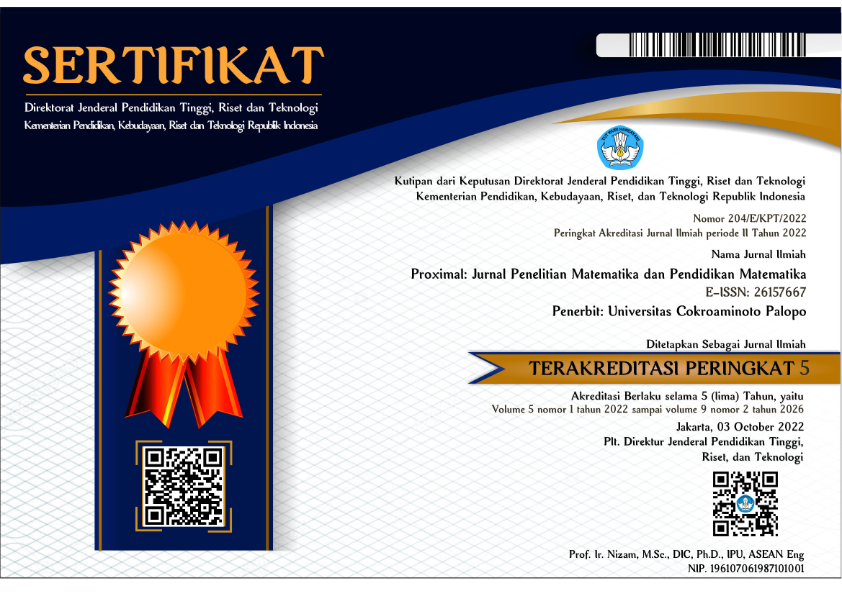Analisis Kemampuan Berpikir Kritis Matematis Siswa Ditinjau dari Kepercayaan Diri
DOI:
https://doi.org/10.30605/proximal.v5i2.1903Keywords:
Kemampuan Berpikir Kritis Matematis, Kpercayaan DiriAbstract
Dalam proses penyelesaian soal serta perbedaan kategori kepercayaan diri dapat mempengaruhi hasil akhir yang mereka temukan. Tujuan dari penelitian ini yaitu untuk menganalisis kemampuan berpikir kritis matematis ditinjau dari kepercayaan diri pada materi sistem persamaan linear tiga variabel. Metode penelitian yang digunakan dalam penelitian ini yaitu metode kualitatif deskriptif. Subjek pada penelitian ini yaitu tiga siswa SMAI Al-Azhar 4. Terdapat empat indikator kemampuan berpikir kritis matematis dalam penelitian ini yaitu interpretasi, analisis, evaluasi, dan inferensi. Hasil penelitian diperoleh bahwa subjek M mencakup empat indicator kemampuan berpikir kritis matematis, N mencakup tiga dari empat indikator yaitu analisis, evaluasi, dan inferensi. Sedangkan subjek H hanya mencakup indikator interpretasi.
References
Aklimawati. (2015). Pengaruh Penerapan Metode Inquiri Terhadap Peningkatan Kemampuan Berpikir Kritis Matematis Siswa. Jurnal Peluang, 4(1), 49–55. DOI: https://doi.org/10.31949/jcp.v1i1.343
Anggraini, E. (2018). Pengaruh Pembelajaran Blended Learning Menggunakan Aplikasi Google Classroom Terhadap Pemahaman Konsep Matematis Pada Peserta Didik Kelas VIII SMPN 9 Bandar Lampung. Skripsi Fakultas Tarbiyah Dan Keguruan Universitas Islam Negeri Raden Intan Lampung, 1(1), 1–139.
Firdaus, Kailani, I., Bakar, M. N. Bin, & Bakry. (2015). Developing Critical Thinking Skills of Students in Mathematics Learning. Journal of Education and Learning, 9(3), 226–236. DOI: https://doi.org/10.11591/edulearn.v9i3.1830
Hendriana, H. (2012). Pembelajaran Matematika Humanis Dengan Metaphorical Thinking Untuk Meningkatkan Kepercayaan Diri Siswa. Infinity Journal, 1(1), 90. https://doi.org/10.22460/infinity.v1i1.9 DOI: https://doi.org/10.22460/infinity.v1i1.9
Kemendikbud: Surat Edaran Nomor 4 Tahun 2020, 3 (2020).
Jumaisyaroh, T., Napitupulu, E. E., & Hasratuddin, H. (2015). Peningkatan Kemampuan Berpikir Kritis Matematis Dan Kemandirian Belajar Siswa Smp Melalui Pembelajaran Berbasis Masalah. Kreano, Jurnal Matematika Kreatif-Inovatif, 5(2), 157. https://doi.org/10.15294/kreano.v5i2.3325 DOI: https://doi.org/10.15294/kreano.v5i2.3325
Khoirunnisa, P. H., & Malasari, P. N. (2021). Analisis kemampuan berpikir kritis matematis siswa ditinjau dari self confidence. JP3M (Jurnal Penelitian Pendidikan Dan Pengajaran Matematika), 7(1), 49–56. https://doi.org/10.37058/jp3m.v7i1.2804 DOI: https://doi.org/10.37058/jp3m.v7i1.2804
Mahmuzah, R., Ikhsan, M., & Yusrizal. (2014). Peningkatan Kemampuan Berpikir Kritis Dan Disposisi Matematis Siswa Smp Dengan Menggunakan Pendekatan Problem Posing. Didaktik Matematika, 1(2), 43–53. https://doi.org/10.24815/jdm.v1i2.2060
Melyana, A., & Pujiastuti, H. (2020). Pengaruh Kepercayaan Diri Terhadap Kemampuan Berpikir Kritis Matematis Siswa Smp. JPMI (Jurnal Pembelajaran Matematika Inovatif), 3(3), 239–246. https://doi.org/10.22460/jpmi.v3i3.239-246
Noor, N. L. (2019). Analisis Kemampuan Berpikir Kritis Matematis Ditinjau Dari Gaya Kognitif Implusif Dan Reflektif. Jurnal Pendidikan Matematika (Kudus), 2(1). https://doi.org/10.21043/jpm.v2i1.6341 DOI: https://doi.org/10.21043/jpm.v2i1.6341
Nurkholifah, S., Toheri, & Winarso, W. (2018). Hubungan Antara Self Confidence Dengan Kemampuan Berpikir Kritis Siswa Dalam Pembelajaran Matematika. Edumatica, 08(1), 58–66. https://doi.org/10.22437/edumatica.v8i01.4623
Rohmat, A. N., & Lestari, W. (2019). Pengaruh Konsep Diri dan Percaya Diri terhadap Kemampuan Kemampuan Berpikir Kritis Matematis. JKPM (Jurnal Kajian Pendidikan Matematika), 5(1), 73. https://doi.org/10.30998/jkpm.v5i1.5173 DOI: https://doi.org/10.30998/jkpm.v5i1.5173
Septiani, T., Hudanagara, M. A., Hendriana, H., & Anita, I. W. (2018). PENGARUH SELF CONFIDENCE DAN SELF EFFICACY TERHADAP KEMAMPUAN BERPIKIR KREATIF MATEMATIS SISWA SMP. JPMI (Jurnal Pembelajaran Matematika Inovatif), 1(2), 185–192. https://doi.org/10.22460/jpmi.v1i4.p667-672 DOI: https://doi.org/10.22460/jpmi.v1i2.p185-192
Shidiq, U., & Choiri, M. (2019). Metode Penelitian Kualitatif di Bidang Pendidikan. In Journal of Chemical Information and Modeling (Vol. 53, Issue 9, p. 221).
Sudarmono, Apuanor, & Utami, E. (2018). Tingkat Kepercayaan diri mahasiswa ditinjau dari public speaking. Journal Paedagogie, 6(2), 71–78.
Umar, W. (2017). Constructing Means Ends Analysis Instruction to Improve Students’ Critical Thinking Ability and Mathematical Habits of Mind Dispositions. International Journal of Education and Research, 5(2), 261–272.
Widana, I. W. (2018). Higher Order Thinking Skills Assessment towards Critical Thinking on Mathematics Lesson. International Journal of Social Sciences and Humanities (IJSSH), 24–32. https://doi.org/10.29332/ijssh.v2n1.74 DOI: https://doi.org/10.29332/ijssh.v2n1.74
Downloads
Published
Issue
Section
License
In submitting the manuscript to the journal, the authors certify that:
- They are authorized by their co-authors to enter into these arrangements.
- The work described has not been formally published before, except in the form of an abstract or as part of a published lecture, review, thesis, or overlay journal.
- That it is not under consideration for publication elsewhere,
- That its publication has been approved by all the author(s) and by the responsible authorities – tacitly or explicitly – of the institutes where the work has been carried out.
- They secure the right to reproduce any material that has already been published or copyrighted elsewhere.
- They agree to the following license and copyright agreement.
License and Copyright Agreement
Authors who publish with this journal agree to the following terms:
- Authors retain copyright and grant the journal right of first publication with the work simultaneously licensed under Creative Commons Attribution License (CC BY 4.0) that allows others to share the work with an acknowledgment of the work's authorship and initial publication in this journal.
- Authors are able to enter into separate, additional contractual arrangements for the non-exclusive distribution of the journal's published version of the work (e.g., post it to an institutional repository or publish it in a book), with an acknowledgment of its initial publication in this journal.
- Authors are permitted and encouraged to post their work online (e.g., in institutional repositories or on their website) prior to and during the submission process, as it can lead to productive exchanges, as well as earlier and greater citation of published work.















